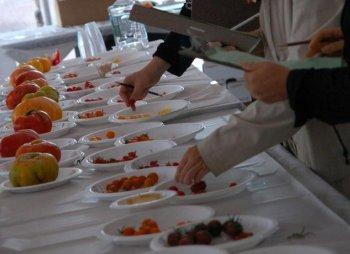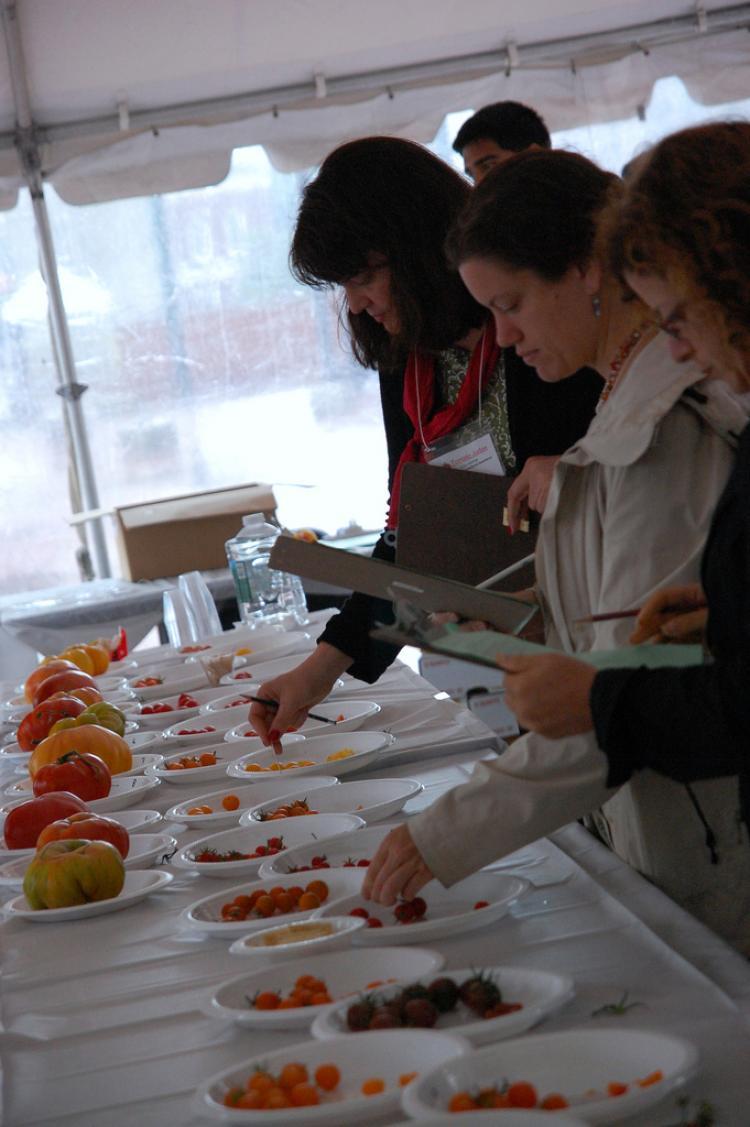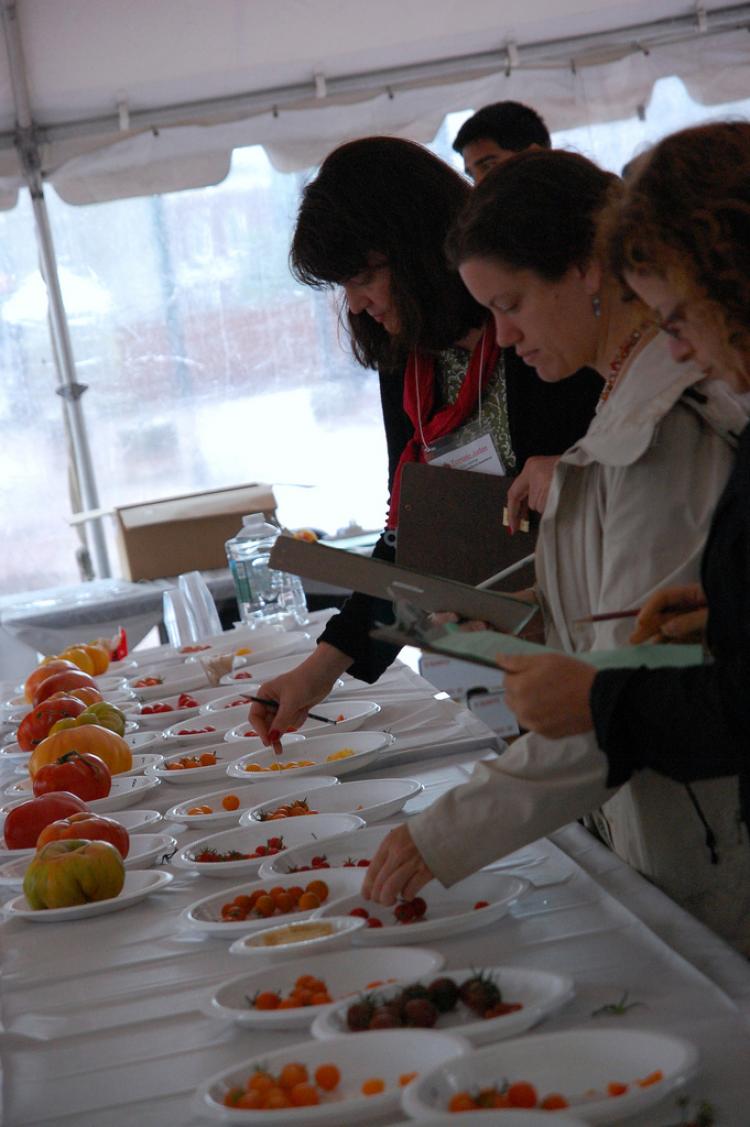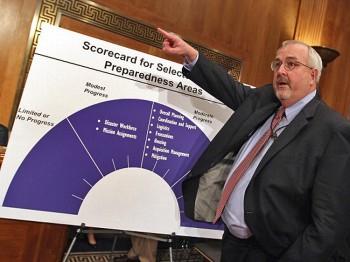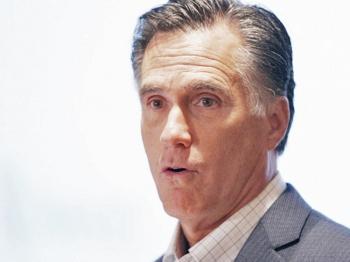Governor Deval Patrick proclaimed Aug. 22–28 as Massachusetts Farmers Market Week. To help kick off the week, the 26th Annual Tomato Festival was held on Aug. 23 at Boston’s City Hall Plaza. The event was “the place” to find the best tomato grower in the state. Of the 98 entries this year, the top prizes went to Kimball Fruit Farm of Pepperell for the Slicing, Heirloom, and Heaviest categories, and Ward’s Berry Farm of Sharon for the Cherry category.
The event is testament to the fact that farmers markets and locally grown produce are important to the state of Massachusetts. Secretary of Energy and Environmental Affairs Ian Bowles conveyed in the department’s press release that the 228 farmers markets throughout the Commonwealth play a vital part in the state’s culture, tradition, and economy.
“Farmers markets showcase the agricultural diversity of Massachusetts and the benefits of buying local the importance in preserving open space,” said Agricultural Resources Commissioner Scott Soares, according to the press release. “Massachusetts’s hard-working farmers continue to supply people throughout the Commonwealth with local goods.”
Farmers markets are congenial places for social as well as economic activities that tend to attract like-minded people of shared perspectives on food and nutrition that often cross over into lifestyles and community values. These markets can provide a strong sense of community.
In providing fresh, delicious, and locally produced food, farmers markets ensure at the same time the viability of Massachusetts’s family farms—many of which rely primarily on their crops as income.
From Cape Cod to the hills of the Berkshires, farming sustains a regional industry with a unique geographic distinction and charm. A traditional New England Thanksgiving dinner packed with fresh apples, cranberry jellies, and award-winning wines is proof enough of the importance of the region’s local fresh produce.
For the last 10 years, the Massachusetts Department of Transportation has facilitated an annual farmers market program at 11 Massachusetts Turnpike service plazas, beginning in May and running through the fall. This year, the department expanded the program to include all 18 service plazas on state highways. Complimentary vending space is available on a first-come, first-served basis at these locations to farmers who sell their goods.
David Webber of the Massachusetts Department of Agriculture and Resources (MDAR) told The Epoch Times that new to Massachusetts farmers markets is the ability to accept SNAP (Supplemental Nutrition Assistance Program) benefits, also known as food stamps, through the use of wireless terminals.
State legislation that passed in mid August will enable the sale of wine in farmers markets across the state, although individual vendors will still need to apply for appropriate local licenses.
Winter farmers markets are still rare in Massachusetts, unlike in New York and Rhode Island; however, about a dozen have taken shape this past winter or are already in the planning stages. Some towns that have started winter farmers markets are Wayland, Natick, Plymouth, Longmeadow, N. Attleboro, Dedham, and Winchester.
In Plymouth and Winchester, a convenient feature of online pre-ordering has been added.
Of the most ambitious is the proposal of an indoor year-round public market in Boston with up to 40,000 square feet under one roof, with space for outdoor vending and parking. The proposed site is parcel-7 (the current Haymarket location). MDAR Assistant Commissioner Nathan L’Etoile said this is still in the formative planning stage and that the project needs about $10 million with legislation for bond funding.
The MDAR is the primary agency that oversees the health and vibrancy of the Massachusetts agricultural community. Working in tandem with other state agencies and private organizations such as the New England Vegetable and Berry Growers Association and the Federation of Massachusetts Farmers Markets, MDAR has made available to Massachusetts residents a rich and varied source of sustainable food and nutrition.
In addition, it provides excellent consumer references to farms, locally grown products, services that are available, as well as a leisure guide to the agricultural community across the state.
The event is testament to the fact that farmers markets and locally grown produce are important to the state of Massachusetts. Secretary of Energy and Environmental Affairs Ian Bowles conveyed in the department’s press release that the 228 farmers markets throughout the Commonwealth play a vital part in the state’s culture, tradition, and economy.
“Farmers markets showcase the agricultural diversity of Massachusetts and the benefits of buying local the importance in preserving open space,” said Agricultural Resources Commissioner Scott Soares, according to the press release. “Massachusetts’s hard-working farmers continue to supply people throughout the Commonwealth with local goods.”
Farmers markets are congenial places for social as well as economic activities that tend to attract like-minded people of shared perspectives on food and nutrition that often cross over into lifestyles and community values. These markets can provide a strong sense of community.
In providing fresh, delicious, and locally produced food, farmers markets ensure at the same time the viability of Massachusetts’s family farms—many of which rely primarily on their crops as income.
From Cape Cod to the hills of the Berkshires, farming sustains a regional industry with a unique geographic distinction and charm. A traditional New England Thanksgiving dinner packed with fresh apples, cranberry jellies, and award-winning wines is proof enough of the importance of the region’s local fresh produce.
For the last 10 years, the Massachusetts Department of Transportation has facilitated an annual farmers market program at 11 Massachusetts Turnpike service plazas, beginning in May and running through the fall. This year, the department expanded the program to include all 18 service plazas on state highways. Complimentary vending space is available on a first-come, first-served basis at these locations to farmers who sell their goods.
David Webber of the Massachusetts Department of Agriculture and Resources (MDAR) told The Epoch Times that new to Massachusetts farmers markets is the ability to accept SNAP (Supplemental Nutrition Assistance Program) benefits, also known as food stamps, through the use of wireless terminals.
State legislation that passed in mid August will enable the sale of wine in farmers markets across the state, although individual vendors will still need to apply for appropriate local licenses.
Winter farmers markets are still rare in Massachusetts, unlike in New York and Rhode Island; however, about a dozen have taken shape this past winter or are already in the planning stages. Some towns that have started winter farmers markets are Wayland, Natick, Plymouth, Longmeadow, N. Attleboro, Dedham, and Winchester.
In Plymouth and Winchester, a convenient feature of online pre-ordering has been added.
Of the most ambitious is the proposal of an indoor year-round public market in Boston with up to 40,000 square feet under one roof, with space for outdoor vending and parking. The proposed site is parcel-7 (the current Haymarket location). MDAR Assistant Commissioner Nathan L’Etoile said this is still in the formative planning stage and that the project needs about $10 million with legislation for bond funding.
The MDAR is the primary agency that oversees the health and vibrancy of the Massachusetts agricultural community. Working in tandem with other state agencies and private organizations such as the New England Vegetable and Berry Growers Association and the Federation of Massachusetts Farmers Markets, MDAR has made available to Massachusetts residents a rich and varied source of sustainable food and nutrition.
In addition, it provides excellent consumer references to farms, locally grown products, services that are available, as well as a leisure guide to the agricultural community across the state.
